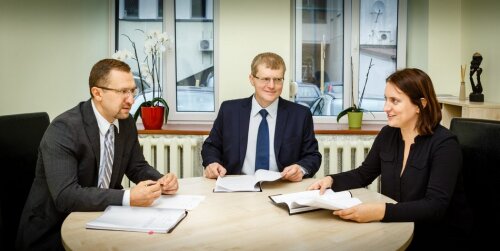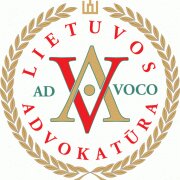Best Will & Testament Lawyers in Republic of Lithuania
Share your needs with us, get contacted by law firms.
Free. Takes 2 min.
Or refine your search by selecting a city:
List of the best lawyers in Republic of Lithuania
About Will & Testament Law in Republic of Lithuania
The concept of a Will and Testament in the Republic of Lithuania revolves around legal documents that allow individuals to specify how their estate should be managed and distributed after their death. Lithuanian law provides a structured framework for both creating a Will and for handling intestate succession (when someone dies without a will). The Civil Code of the Republic of Lithuania is the primary legal source governing these matters, ensuring individuals' wishes are respected while providing clarity and protection for their heirs and beneficiaries.
Why You May Need a Lawyer
There are various situations where seeking legal assistance with Will and Testament matters in Lithuania might be necessary:
- Drafting a Will: Ensuring the document complies with legal standards and properly reflects your wishes.
- Updating a Will: Modifying your Will to include new assets, changes in personal circumstances, or shifting family dynamics.
- Probate Processes: Navigating the complex procedures after the passing of a loved one.
- Disputes: Handling conflicts or disagreements among heirs or beneficiaries.
- Intestate Succession: Managing the distribution of an estate when no valid Will exists.
Local Laws Overview
Key aspects of local laws relevant to Will & Testament in the Republic of Lithuania include:
- Capacity: The testator must be an adult (18 years or older) and of sound mind.
- Formal Requirements: For a Will to be valid, it must be written, dated, and signed by the testator, with two witnesses present.
- Notarized Wills: While not compulsory, having a Will notarized can enhance its legitimacy and ease probate procedures.
- Revocation: A Will can be revoked or amended by creating a new Will or a formal revocation document.
- Heirs' Rights: Legal heirs have rights to a portion of the estate, which cannot be entirely disinherited without justified reasons as per law.
Frequently Asked Questions
Do I need a lawyer to write a Will?
No, you do not legally need a lawyer to write a Will in Lithuania, but consulting one can ensure it meets all legal requirements and adequately reflects your intentions.
What happens if I die without a Will in Lithuania?
If you die without a Will, your estate will be divided according to the intestate succession laws in Lithuania, prioritizing closest relatives.
Can I exclude certain relatives from my Will?
Excluding heirs is permissible, but certain close relatives (e.g., children, spouse) have statutory rights to a portion of the estate unless legally justifiable reasons for exclusion exist.
How can I update my Will?
You can update your Will by writing a new one that revokes the previous Will, or by adding a codicil (an amendment) to your existing Will.
Is a handwritten Will valid in Lithuania?
Yes, as long as the Will is written, dated, and signed by the testator in the presence of two witnesses who also sign it, it is considered valid.
Can I include digital assets in my Will?
Yes, you can include digital assets such as online accounts, cryptocurrencies, and digital files in your Will.
What are the duties of an executor in Lithuania?
An executor manages the estate following the Will’s instructions, pays debts and taxes, and distributes assets to beneficiaries.
How is inheritance tax handled in Lithuania?
Inheritance tax depends on the value of the estate and the relationship between the deceased and the heir. Close family members typically benefit from significant exemptions.
Can Wills be contested in Lithuania?
Yes, Wills can be contested on grounds of fraud, duress, lack of capacity, or improper execution. The court evaluates these claims.
What documents are needed for probate in Lithuania?
Typically, the original Will, death certificate, and a list of the deceased's assets and liabilities are required.
Additional Resources
Here are some resources that can provide further assistance:
- The Lithuanian Bar Association: For finding accredited lawyers specialized in Will and Testament law.
- The Ministry of Justice of the Republic of Lithuania: For official legal information and updates.
- Notary Chamber of Lithuania: For services related to notarizing Wills and other legal documents.
- State Enterprise Centre of Registers: For registering your Will, ensuring its accessibility after your death.
Next Steps
If you need legal assistance regarding a Will and Testament in Lithuania, consider the following steps:
- Consult with a lawyer specialized in estate planning to discuss your needs and options.
- Gather all necessary personal and financial documentation.
- Prepare a draft of your Will with the help of your lawyer.
- Meet with witnesses and possibly a notary to finalize and authenticate the document.
- Consider registering your Will with the State Enterprise Centre of Registers for safekeeping and accessibility.
- Regularly review and update your Will to reflect any significant changes in your life or assets.
Lawzana helps you find the best lawyers and law firms in Republic of Lithuania through a curated and pre-screened list of qualified legal professionals. Our platform offers rankings and detailed profiles of attorneys and law firms, allowing you to compare based on practice areas, including Will & Testament, experience, and client feedback.
Each profile includes a description of the firm's areas of practice, client reviews, team members and partners, year of establishment, spoken languages, office locations, contact information, social media presence, and any published articles or resources. Most firms on our platform speak English and are experienced in both local and international legal matters.
Get a quote from top-rated law firms in Republic of Lithuania — quickly, securely, and without unnecessary hassle.
Disclaimer:
The information provided on this page is for general informational purposes only and does not constitute legal advice. While we strive to ensure the accuracy and relevance of the content, legal information may change over time, and interpretations of the law can vary. You should always consult with a qualified legal professional for advice specific to your situation.
We disclaim all liability for actions taken or not taken based on the content of this page. If you believe any information is incorrect or outdated, please contact us, and we will review and update it where appropriate.
Browse will & testament law firms by city in Republic of Lithuania
Refine your search by selecting a city.















